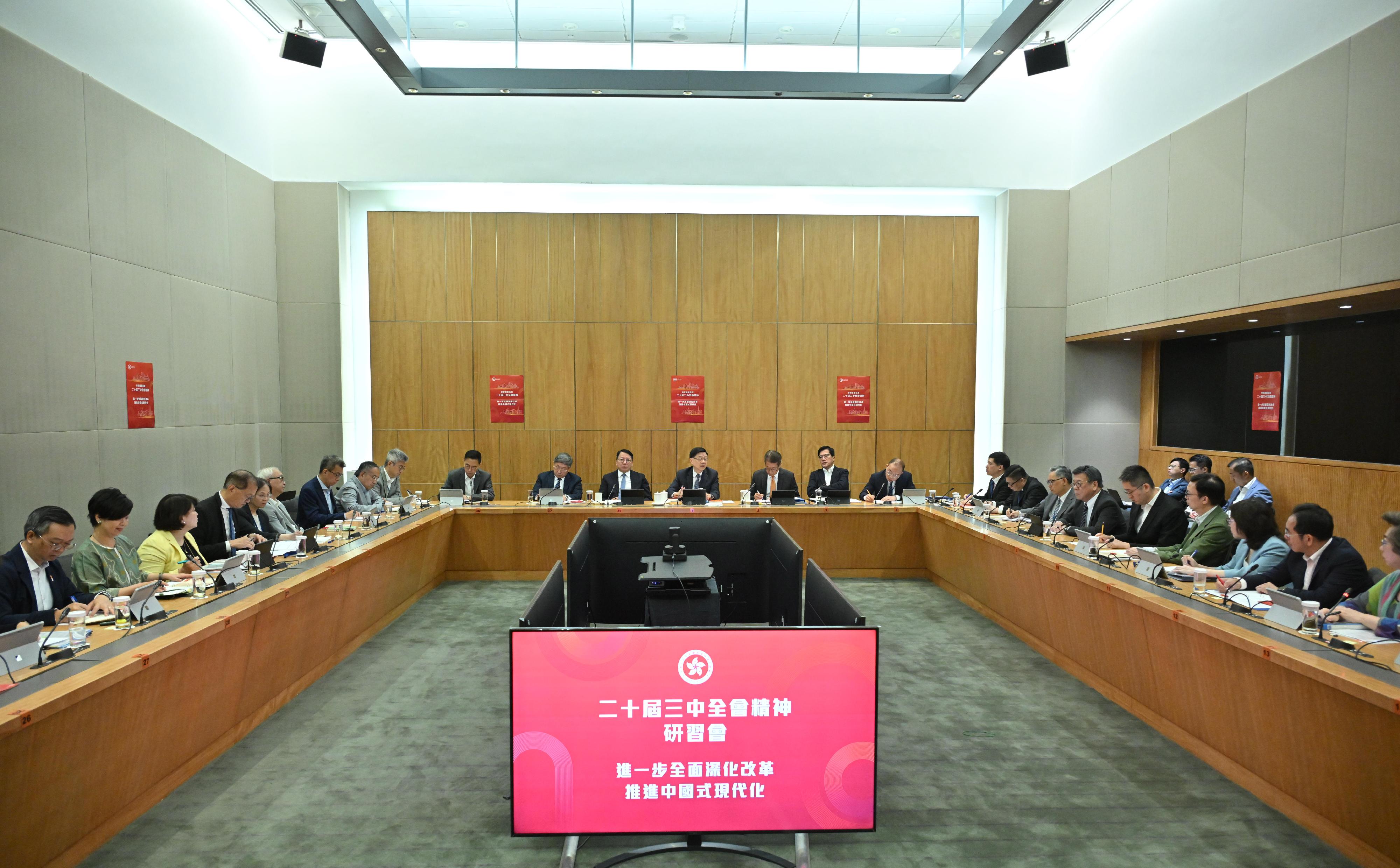HKSAR Government studies spirit of Third Plenary Session of 20th CPC Central Committee (with photo)
The Third Plenary Session of the 20th Central Committee of the Communist Party of China (CPC Central Committee) concluded victoriously on July 18. The Plenary Session adopted the Resolution of the CPC Central Committee on Further Deepening Reform Comprehensively to Advance Chinese Modernization. The Chief Executive, Mr John Lee, attaches great importance to the Plenary Session and the Resolution. He hosted a seminar at the Chief Executive's Office today (August 9) for Principal Officials of the Hong Kong Special Administrative Region (HKSAR) Government, including the Secretaries of Departments and the Directors of Bureaux, to seriously study and gain an in-depth understanding of the spirit of the Plenary Session, with a view to leading various sectors of the HKSAR to comprehensively study and implement the spirit of the Plenary Session.
The Plenary Session affirmed that the overall objectives of further deepening reform comprehensively are to continue improving and developing the system of socialism with Chinese characteristics and modernise China's system and capacity for governance. The Resolution raised over 300 major reform measures covering plans for reform in areas including political, economic, cultural, social, ecological conservation and national security.
Mr Lee explained to the participants the importance of the Plenary Session and the key content of the Resolution, as well as their implications for Hong Kong's future development. He said that the Plenary Session has studied the issues of further deepening reform of the country comprehensively to advance Chinese modernisation, which has profound impacts on Hong Kong as well as the whole world. He highlighted a number of key contents related to Hong Kong, including the need to harness the institutional strengths of the "one country, two systems" principle, to reinforce and enhance Hong Kong's status as an international financial, shipping and trade centre, to support Hong Kong in building itself into an international hub for high-calibre talent, and to strengthen the work on the development of the Guangdong-Hong Kong-Macao Greater Bay Area, so as to facilitate Hong Kong's active role in the opening up of the country. The Chief Secretary for Administration, Mr Chan Kwok-ki; the Financial Secretary, Mr Paul Chan; the Secretary for Constitutional and Mainland Affairs, Mr Erick Tsang Kwok-wai; and the Secretary for the Civil Service, Mrs Ingrid Yeung, shared their views at the seminar.
Mr Lee said that in addition to leading the country towards Chinese modernisation and high-quality development, the Plenary Session is also crucial to the development, prosperity and stability of Hong Kong in the long run. Hong Kong has been playing an active role in the country's reform and opening up. As a "super connector" and "super value-adder" connecting the Mainland with the world, Hong Kong endeavours to facilitate the country's effort in going global while attracting foreign investment to the Mainland market. In the face of accelerating global changes of a kind not seen in a century, the HKSAR will be more proactive in its integration into the national development and utilising its unique advantages, to realise its own breakthroughs and to leverage Hong Kong's strengths to serve the country's needs. He instructed officials of the HKSAR Government to have a thorough understanding of the spirit of the Plenary Session, and to implement and uphold the spirit in their daily work, in order to strive for promoting the high-quality development of the country and Hong Kong and the advancement of Chinese modernisation. The HKSAR Government will stay committed to implementing the spirit of the Plenary Session and strive to grasp the opportunities to consolidate and enhance its strengths in the course of development and advancing Hong Kong from stability to prosperity, in a bid to make greater contributions to the building of a great country in all respects and advancing toward national rejuvenation through Chinese modernisation.
